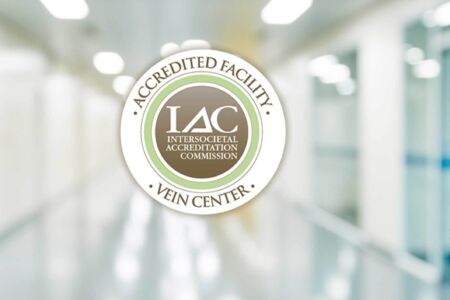
Proposed Changes to IAC Vein Center Standards
The Intersocietal Accreditation Commission (IAC) provides accreditation programs for vein treatment and management. The IAC programs for accreditation are dedicated to ensuring quality patient care and promoting health care and all support one common mission: Improving health care through accreditation®.
At the most recent IAC board meeting, members discussed two significant changes to the current standards. These changes are currently in a comment period and will likely go into effect by Fall of 2020. The first major change deals with providing guidance for Advanced Practice Providers (APPs) in accredited Vein Centers. The second change pertains to adding an additional pathway for qualification for the Medical Director and/or Medical Staff.
Under the revised Vein Center Standards, APPs may perform the following superficial vein skills: patient evaluation and management, visual sclerotherapy, ambulatory phlebectomy and saphenous vein ablation under the personal supervision of a qualified medical staff member. Personal supervision is defined as the Physician is in attendance and in the room during the procedure. An APP may also perform certain skills with direct or general supervision within the vein center after qualifying in at least one of three pathways summarized in the Table below. Direct supervision is defined as the Physician must be present in the office suite, immediately available and general supervision is defined as Physician presence is not required during the procedure but should be available by phone.
Skill | New providers without prior skill specific experience | Provider with skill specific experience in a facility other than the applicant facility | Provider with skill specific experience in the applicant facility |
Evaluation and Management of Venous Disease | A minimum of 100* patients evaluated over the previous three years under personal supervision1 of a qualified medical staff member. At least 30* cases must include personal observation of that patient’s diagnostic venous ultrasound examination(s). | A minimum of 25* patients evaluated over the previous three years under personal supervision1 of a qualified medical staff member. | A minimum of 25* patients evaluated over the previous three years under personal1, direct2, or general supervision3 of a qualified medical staff member. |
Visual Sclerotherapy | A minimum of 50* cases over the previous three years under personal supervision1 of a qualified medical staff member. | A minimum of 10* cases over the previous three years under personal supervision1 of a qualified medical staff member. | A minimum of 10* cases over the previous three years under personal1, direct2, or general supervision3 of a qualified medical staff member. |
Ambulatory Phlebectomy | A minimum of 50* cases over the previous three years under personal supervision1 of a qualified medical staff member. | A minimum of 10* cases over the previous three years under personal supervision1 of a qualified medical staff member. | A minimum of 10* cases over the previous three years under personal1 or direct supervision2 of a qualified medical staff member. |
Ultrasound-guided Foam Sclerotherapy | A minimum of 150* cases over the previous three years under personal supervision1 of a qualified medical staff member. OR A minimum of 50* cases over the previous three years under personal supervision1 of a qualified medical staff member if the APP holds an appropriate credential in vascular testing (RVT, RVS, RT(VS), RPhS). | A minimum of 50* cases over the previous three years under personal supervision1 of a qualified medical staff member. | A minimum of 50* cases over the previous three years under personal1 or direct supervision2 of a qualified medical staff member. |
Wound Care | A minimum of 20* cases over the previous three years under personal supervision1 of a qualified medical staff member. | A minimum of 10* cases over the previous three years under personal supervision1 of a qualified medical staff member. | A minimum of 10* cases over the previous three years under personal1, direct2, or general supervision3 of a qualified medical staff member. |
In addition, APPs now have guidance and requirements for qualification, similar to Medical Staff. All APPs are required to have a minimum of 30 hours of venous specific CME within the last 3 years. They must also
have current Basic Life Support certification, and if performing procedures with moderate/IV sedation, Advanced Cardiac Life Support certification is required (even if another provider participating in moderate/IV sedation cases already possesses such certification).
With regards to Medical Director and Medical Staff qualifications, applicants can now qualify with certification by the American Board of Venous and Lymphatic Medicine. Previously, the only pathways available were either by documentation of experience or by formal training (Residency in a vascular specialty or Fellowship).
The full current and proposed Vein Center Standards can be found at https://www.intersocietal.org/vein/main/newsroom.htm. Comments are accepted until August 15, 2020.
Khanh Q. Nguyen, DO, RPVI
Dr Nguyen is the Chief Medical Officer for the Center for Vein Restoration and serves on the IAC Vein Center Board of Directors as a representative of the American Vein and Lymphatic Society (AVLS). Dr. Nguyen holds active certifications by the American Board of Osteopathic Emergency Physicians, the American Board of Venous and Lymphatic Medicine, and is a Registered Physician in Vascular Interpretation.